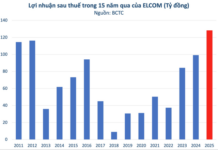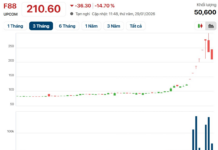
FECON Empire of Chairman Pham Viet Khoa has its first loss in the first year since going public
FCN records a net loss of 42 billion dong in 2023
According to the financial report for Q4/2023, net revenue of FECON Joint Stock Company (HoSE: FCN) increased by 25% compared to the same period, reaching over 1,049 billion dong. After deducting costs, the gross profit of this construction company increased significantly by 161% compared to the same period last year, reaching 157.5 billion dong.
During the period, the financial activities of the company recorded a negative revenue of 0.3 billion dong, while the costs for this activity increased sharply by 41%, reaching nearly 102 billion dong, primarily due to an increase in interest expenses of nearly 80 billion dong, equivalent to a 36% increase compared to the same period.
Although other expenses such as sales costs and business management costs in this period were cut by 14% and 4% respectively compared to the same period, the company still recorded a post-tax loss of nearly 45 billion dong.
Therefore, due to the lack of revenue from the sale of solar power projects, along with the sharp increase in interest rates resulting from the increase in interest rates at the end of 2022, FCN had its first loss in the year since going public on the stock exchange.
Explaining the above-mentioned business results, the company’s management said that the main reason is the significant decrease in financial revenue due to the absence of revenue from the sale of Vĩnh Hảo 6 solar power projects, so although revenue and gross profit increased relatively well, they were not enough to compensate for this difference. In addition, interest expenses increased sharply due to the impact of the interest rate increase at the end of 2022 and the increase in debt.
Accumulated in 2023, FCN’s net revenue reached over 2,879 billion dong, decreased by 5% compared to the previous year. The post-tax loss was over 42 billion dong, compared to a profit of nearly 52 billion dong last year. This is also the first year of loss-making of this construction company since it was listed on the stock exchange.
As of the end of 2023, the company’s total assets reached over 8,773 billion dong, an increase of nearly 16% from the beginning of the year. Of which, the largest fluctuation is the cash and cash equivalents recognized at over 700 billion dong, increased 4 times from the beginning of the year. The short-term advances to sellers amount to 676 billion dong, an increase of 440 billion dong. Investment in associated companies and joint ventures doubled from the beginning of the year, to 329 billion dong.
In the accounting balance sheet, FCN’s payable amount reached over 5,413 billion dong, an increase of over 32% compared to the end of the year, of which the majority is short-term debts with over 4,390 billion dong. The largest fluctuation in the company’s total debt is the account of short-term advance payments which increased nearly 870 billion dong, to 1,154 billion dong, however, the company did not specify the details.
FCN and expansion into other industries
FCN is known as a leading enterprise in foundation construction and underground works serving the construction of high-rise buildings, industrial projects, transportation, and irrigation. With over 19 years of experience in construction and infrastructure development in Vietnam, the company has gradually expanded to other Southeast Asian countries.
Some notable projects they have participated in include: Hanoi Metro Line 3, Long Son Refinery Complex, Hoa Phat Dung Quat Steel Project, Ben Thanh Metro Line 1, Thilawa Port (Myanmar).
In recent years, FCN has continuously expanded its operations into other sectors such as agriculture, real estate, financial investment, energy, and transportation… However, the reality shows that these steps have not really brought the desired strategic effectiveness as the company intended.
In the real estate sector, it is known that FCN participated very early in the Phu Quoc market, but then the company withdrew from there without fully benefiting from its investment.
In addition, at the beginning of 2023, Fecon Co., Ltd. Yen, a subsidiary of Fecon Joint Stock Company, also officially announced becoming the investor of the Nam Thai Urban Area Project (with an area of 24.68ha) in Pho Yen City – Thai Nguyen Province, with a total investment of 2,250 billion dong.
Previously, Fecon Joint Stock Company Hoa Binh (a member of the Fecon Group) received a decision to become the investor in the construction of technical infrastructure of the Danh Thang – Doan Bai Industrial Cluster Project in Bac Giang with a total investment of nearly 1,000 billion dong. The period of investment in the construction of technical infrastructure for industrial clusters from 2023 and starting operations from the 3rd quarter of 2024.
At the end of December 2019, this contractor sent a document to the Provincial People’s Committee of Hung Yen proposing to be assigned to study, survey, finance the master plan and propose implementation of the My Hao Garden City urban area project in Nhan Hoa and Phan Dinh Phung wards, My Hao town.
In late May 2020, the joint venture Fecon Joint Stock Company – DLG Holdings Investment Corporation sent a document to the People’s Committee of Dong Thap province regarding the proposal to study, survey, finance the planning of sub-areas and implement investment projects in Ward 3, Ward 4, and a part of Tan Quy Dong Ward, Sa Dec City.
At the end of April 2022, Mr. Pham Viet Khoa – Chairman of Fecon announced that Fecon decided to invest in other types of projects including renewable energy, industrial areas, satellite cities of major cities.
Expressing a quite ambitious move when expanding into the real estate sector, however, until now, it can be seen that the achieved results have not had significant positive contributions to the overall business picture of FCN.
In other sectors such as financial investment, energy, transportation, agriculture, in recent times, FCN has taken steps to withdraw when the effectiveness is not as expected, in order to focus back on the core activity area that has built the reputation for FCN, which is construction, especially foundation and underground works.
What are the prospects for FCN
According to the research department of Mirae Asset Vietnam Securities, FCN is continuing to complete large contracts, estimating a backlog of about 4,000 billion dong (unfinished projects), including some typical projects such as: Nhon Trach 3&4 Thermal Power Plant project, a contract value of about 889 billion dong, with responsibilities for constructing foundations and infrastructure; Vung Ang II Thermal Power Plant project, contract value of about 1,125 billion dong, with tasks such as: construction of coal bunker foundations, precast culverts, etc; Long Thanh Airport Project, FCN is in charge of the foundation with a contract value of about 410 billion dong.
In addition, many ongoing projects such as: Lach Huyen Port No. 5,6 (implementing cement pile foundation consolidation), Hoa Phat – Dung Quat Phase 2 (land treatment, driven pile construction), Hanoi Metro Line 3 (participate in foundation work, underground tunnels), Km91+800 – Km114+200, segment Hau Giang – Ca Mau of the Bac – Nam Expressway construction project (road foundation construction, horizontal drainage pipes), etc.
In 2024, according to Mirae Asset Vietnam, FCN’s forecasted revenue and net profit will reach 3,177 billion dong and 89 billion dong, increasing by 17% and 242% compared to the same period: Gross profit margin decreased from 17% to 16% because the forecasted steel price (raw material accounting for over 30% of FCN’s product cost) increased by 8% compared to the same period; Construction business revenue reached 2,731 billion, up 16% compared to the same period; Electricity business revenue increased 17% compared to the same period; Financial revenue and financial expenses decreased by 32% and 17% respectively compared to the same period.















